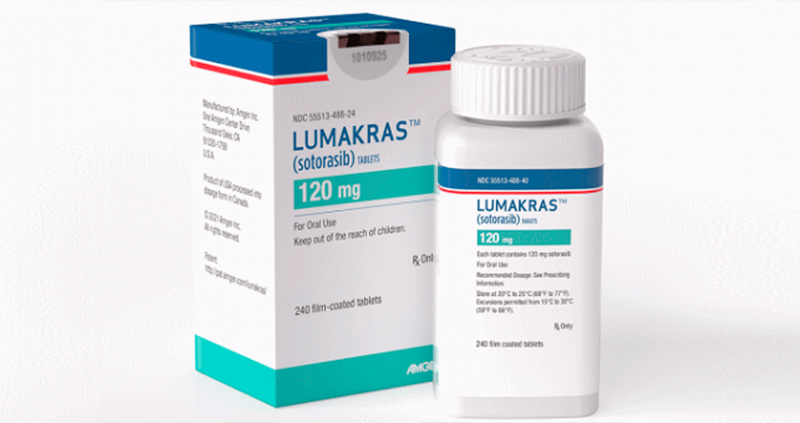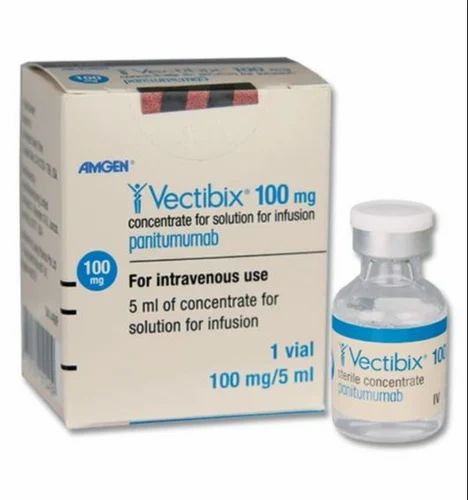ComboMATCH trial (EAY191-E5) aims to evaluate the effectiveness of AMG 510 (sotorasib), both with and without the addition of panitumumab, in treating patients with advanced solid tumors harboring the KRAS G12C mutation.
This type of tumor may have spread from its original site to surrounding tissues, lymph nodes, or even distant areas of the body. Sotorasib, a KRAS inhibitor, belongs to a class of medications that work by targeting and blocking the activity of the mutated KRAS protein. This abnormal protein typically signals cancer cells to proliferate, and by inhibiting it, sotorasib helps slow or halt the uncontrolled growth and spread of cancer cells.
Panitumumab, a monoclonal antibody, works differently by interfering with the epidermal growth factor receptor (EGFR) on the surface of cancer cells, effectively slowing or stopping their growth. By combining these two treatments, sotorasib and panitumumab, the trial is investigating whether the combination therapy can have a greater effect in killing cancer cells and reducing tumor growth in patients with advanced KRAS G12C mutant solid tumors.
The ultimate goal of this trial is to determine whether the combination of sotorasib and panitumumab can be more effective in treating advanced cancers with this specific genetic mutation, potentially offering new hope for patients with limited treatment options.
ECOG-ACRIN Cancer Research Group Started the Trial
The ECOG-ACRIN Cancer Research Group (ECOG-ACRIN) is a prominent scientific organization focused on cancer research involving adults who have or are at risk of developing cancer. With nearly 1,400 academic and community-based cancer centers and hospitals worldwide, the group is supported by approximately 21,000 oncology professionals, including physicians, translational scientists, and research staff from member institutions, as well as advocates.
Known for its scientific rigor and multidisciplinary approach, ECOG-ACRIN is highly regarded both nationally and internationally. It plays a key role as part of the National Institutes of Health’s National Cancer Institute (NCI) through the National Clinical Trials Network (NCTN), and also serves as a Research Base for the NCI Community Oncology Research Program (NCORP). Funded primarily by the NCI, ECOG-ACRIN also receives support from private sector collaborations and philanthropic contributions to advance its mission.
About Sotorasib
Sotorasib, marketed under the brand names Lumakras and Lumykras, is an anti-cancer medication primarily used to treat non-small cell lung cancer (NSCLC). It specifically targets the G12C mutation in the KRAS gene, a mutation linked to various types of cancer. As an inhibitor of the RAS GTPase family, sotorasib works by blocking the activity of the mutated KRAS protein, which plays a role in driving the growth of cancer cells.
The most commonly reported side effects of sotorasib include diarrhea, musculoskeletal pain, nausea, fatigue, liver damage, and cough.
Sotorasib is notable for being the first approved targeted therapy for patients whose tumors carry any type of KRAS mutation, which accounts for approximately 25% of mutations found in non-small cell lung cancers. Specifically, KRAS G12C mutations occur in about 13% of NSCLC cases. Sotorasib was granted approval for use in the United States in May 2021 and in the European Union in January 2022, offering a new treatment option for patients with this specific genetic mutation in their tumors.

About Panitumumab
Panitumumab, marketed under the brand name Vectibix, is a fully human monoclonal antibody that targets the epidermal growth factor receptor (EGFR), also known as ErbB-1 or HER1 in humans. This receptor plays a critical role in the growth and division of cancer cells, and panitumumab works by inhibiting its activity, potentially slowing or stopping tumor growth.
Manufactured by Amgen, panitumumab was originally developed by Abgenix Inc. In 2014, Amgen partnered with Illumina to develop a companion diagnostic to identify patients who would benefit most from panitumumab therapy.

Panitumumab was first approved by the U.S. Food and Drug Administration (FDA) in September 2006 for the treatment of EGFR-expressing metastatic colorectal cancer that had progressed despite prior treatments. It was later approved by the European Medicines Agency (EMEA) in 2007 and by Health Canada in 2008 for use in patients with wild-type KRAS and EGFR-expressing metastatic colorectal cancer that was refractory to other therapies.
One of the key aspects of panitumumab’s development is that it was the first monoclonal antibody to demonstrate the use of KRAS mutation status as a predictive biomarker. This means that the presence of specific KRAS mutations can help predict how patients will respond to panitumumab treatment, enabling more personalized and effective cancer therapies.
ComboMATCH Treatment Trials
ComboMATCH is an extensive precision medicine initiative designed to evaluate new anti-cancer drug combinations in specific patient populations, including both adults and children with cancer. The initiative involves a series of clinical trials that focus on testing the effectiveness of particular drug combinations, typically in phase 2 trials. These trials aim to identify the best therapeutic approaches by evaluating the combination of two targeted therapies or chemotherapy alongside a targeted drug. Targeted therapy works by specifically addressing the changes within cancer cells that enable them to grow, divide, and spread, offering a more precise and often less toxic approach than traditional chemotherapy.
Although most of the trials in ComboMATCH are focused on advanced solid tumors, each trial has its own unique set of inclusion and exclusion criteria, which could include factors like the type of cancer, genetic abnormalities in the tumor, disease stage, prior treatments, and the patient’s age. To participate in a ComboMATCH trial, patients must first enroll in the ComboMATCH Patient Registration Trial (EAY191), which involves a screening assessment to help determine their eligibility for specific treatment trials. This process ensures that the right patients are matched with the most suitable clinical trial based on their individual disease characteristics.
Eligibility Criteria for the ComboMATCH EAY191-E5 Trial
Trial Objectives and Outlines
Primary Objectives:
- Evaluate the efficacy of AMG 510 (sotorasib) combined with panitumumab versus AMG 510 alone in patients with advanced/metastatic KRAS G12C mutated solid tumors (excluding CRC and NSCLC) based on progression-free survival (Cohort 1).
- Assess the efficacy of the AMG 510 and panitumumab combination in patients with advanced/metastatic KRAS G12C mutated tumors who have progressed after prior KRAS G12C inhibitor treatment, based on response rate (Cohort 2).
Secondary Objectives:
- Measure the efficacy of the combination therapy versus AMG 510 alone in Cohort 1 based on response rate, disease control rate, and overall survival.
- Evaluate disease control rate, progression-free survival, and overall survival for the combination in Cohort 2.
- Assess the safety and tolerability of the combination.
- Collect tissue and analyze mutation profiles to compare with the ComboMATCH Registration Protocol.
Correlative Exploratory Objectives:
- Investigate the impact of concomitant mutations on clinical benefit.
- Explore the correlation of ctDNA changes with treatment response.
- Evaluate KRAS mutant allele fraction as a clinical benefit predictor.
- Examine ERK 1/2 and PI3K pathway activation in relation to treatment response or resistance.
Trial Design:
- Cohort 1: Patients who have never received a KRAS G12C inhibitor are randomized into Arm A (sotorasib + panitumumab) or Arm B (sotorasib alone).
- Cohort 2: Patients who have previously received a KRAS G12C inhibitor are assigned to Arm C (combination therapy of sotorasib and panitumumab).
Patients undergo regular assessments, including blood tests, biopsies, and imaging (CT or MRI) to monitor progress.
For more information, visit ComboMATCH trial Homepage.



